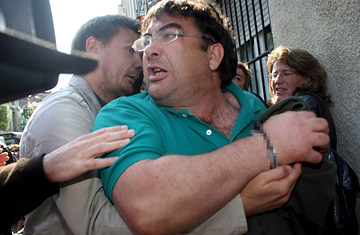
Francisco Javier Lopez Pena arrested on the 20th May by the French Police in Bordeaux.
How do you catch a fugitive leader of the Basque terrorist group ETA? Have someone lead you to him. At least that appears to be how French police, working with the Spanish Civil Guard, captured Francisco Javier Lopez Pena and three other alleged members of the separatist terror organization on May 20. According to reports in the Spanish media (which the Interior Ministry will neither confirm nor deny), police followed Jose Antonio Barandiaran, former mayor of the Basque town of Andoain, to a meeting he held with Lopez in France on May 18th. Two days later, gendarmes burst into a Bordeaux apartment and arrested Lopez and the others.
The arrests are significant. Lopez Pena, who went by the alias 'Thierry,' was "the person with most political and military weight in the group," said Spanish Interior Minister Alfredo Perez Rubalcaba at a press conference on Wednesday. As a leader of the political wing of ETA, Lopez is believed to have ordered recent attacks, such as the May 14 car bomb that killed a member of the Guardia Civil. He was one of the negotiators at 2006 peace talks between ETA and the Spanish government, though his rigid stance may have contributed to their failure; he has also been cited by police sources as having ordered the December 30, 2006 bombing at Madrid's airport, which killed two and definitively doomed those talks. "I don't know if he was 'Number One' like the papers are saying," says Carmen Gurruchaga, author of several books on ETA. "But he is one of the bad guys. He is one of the hard-liners."
For all of Lopez's importance, the information that his arrest reveals may be even more relevant. For one thing, the manner in which the Bordeaux cell was exposed confirms the ways in which, experts believe, the political leadership of ETA interacts with its supporters. "The purpose of the political apparatus is to receive information and issue orders," says Florencio Dominguez, editor-in-chief of the news agency Vasco Press and author of several books on the band. "For both, ETA uses intermediaries, personal contacts who aren't well known but who can transmit information between them and their base among the [illegal] nationalist parties."
Barandiaran had apparently been under suspicion by Spanish counterterrorism forces for playing just such a role. During the time he was mayor of Andoain, separate ETA attacks killed two of the town's residents; Ainhoa Ozaeta, the masked woman who appeared in the video that announced the 2006 ceasefire and who was one of the others arrested in Bordeaux Tuesday night, was his deputy mayor. "They would have had plenty of reason to monitor him," says Gurruchaga. "Andoain is a place where ETA has a lot of allies. And whenever there was an attack or a robbery, you would hear that the suspects had been last seen in Andoain, and then they would disappear. Someone was hiding them." Barandiaran was arrested separately on Wednesday.
In the Bordeaux raid, police also seized several computers and flash disks, which will likely require deciphering since ETA usually encrypts its internal communications. "That might be the most significant thing of all," says Dominguez. "In 1987, police found a house that functioned as the political apparatus' archive, and it revealed all the links between the leadership and every organization — the political parties, the youth groups, the unions — it had contact with. The same thing happened with documentation police captured in 1993 — that information laid the groundwork for the outlawing of Batasuna in 1998."
The one thing that the arrests are unlikely to do, however, is to stem ETA's violence. On Thursday in fact, Spain's Interior Ministry issued a special alert to Basque police forces urging them to "tighten precautions" in the face of likely attacks. ETA has a habit of striking after arrests in an effort to counteract the perception — especially among its own supporters — that it is weakened. "They'll compensate with a terrorist attack that will animate their base," says Dominguez. "After all, the arrests only affected the political wing, the military part wasn't touched. So they could attack at any time. They could attack this afternoon."
